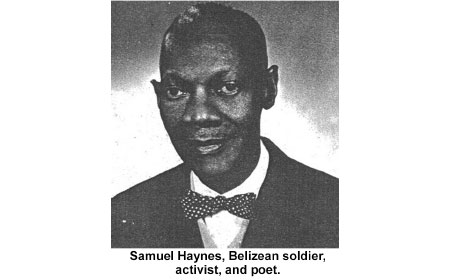As the September celebrations draw closer, many Belizeans are beginning to feel very patriotic and proud of their country. Some have already started to decorate their houses and business, while others prepare for Carnival, the Battle of St. George Caye and Independence Day road marches.
Throughout the country many students will have already started the new school year and are accustomed to singing Belize’s National Anthem.
However, many within the new generation of Belizeans are not aware of the history of this great song.
The National Institute of Culture and History (NICH) provides short biographical information on various Belizean heroes and benefactors, and one such unsung hero is Mr . Samuel Alfred Hayes.
According to NICH, Belize’s National Anthem, “O Land of the Free,” was written by Samuel Alfred Hayes and music was by Selwyn Walford Young, in 1963. Samuel Hayes (1898 – 1971), a social activist, was a soldier in World War 1 and along with other Belizeans soldiers fought in the colonial effort for Great Britain.
However, due to the abuse, discrimination, unfair pay he suffered in the war along with the other colored soldiers, he returned to Belize (then British Honduras) and became a key witness to the commission in the inquiry of the Ex-Servicemen’s Riot of 1919. It could be said that perhaps due to these turmoils he was suffering that he initially wrote the poem as a form of retaliation against colonialism and how it was oppressing Belizeans. The poem, titled “Land of the Gods,” was a salute to the explosion of organized religion in Belize.
During the emancipation efforts of British Honduras as a sovereign nation from Great Britain, the People’s United Party (PUP), led by George Cadle Price along with other founding fathers, began preparations and search for symbols representing Belize’s identity.
Due to language and inspirational words referring to Belize’s former status as a slave society as a result of the mahogany logging and forestry, and cleverly connecting it to the end of Belize’s colonial period , on Independence Day, September 21, 1981, the ruling PUP named the now renamed “O Land of the Free” as Belize’s Official anthem and played the lyrics and music at the Independence Day ceremonies.
Over the years, the lyrics of the national anthem has come under scrutiny from critics who state that the lyrics are outdated, male-centric and does not portray all the ethnicities in Belize, while others have continued to praise its historical references as a reminder of the struggles of Belizeans in the past.
However, during these September Celebrations, as we reflect on the theme, “Belize Renewed, Confident, Competitive, and Committed,” we will continue to be patriotic and raise our flags in the name of country, and proudly sing our national anthem, “O Land of the Free.”
(The National Institute of Culture and History in Belize is located in the City of Belmopan and is a statutory body which seeks to encourage Belizeans and persons interested in Belize to better understand the historical and ethnic roots of the country.)

